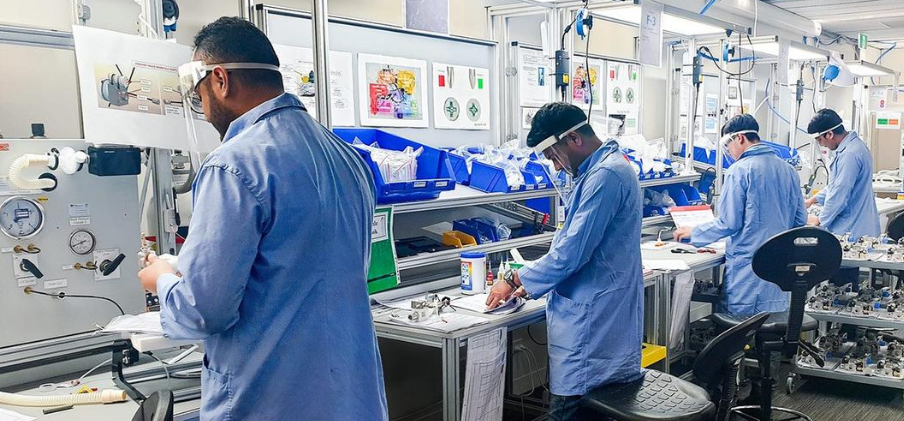How entrepreneurship saved Aussie lives when COVID-19 hit

In summary
Swinburne alum Jefferson Harcourt spearheaded the rapid development of thousands of life-saving ventilators early in the COVID-19 pandemic
The project involved a consortium of medical, manufacturing and research organisations, including Swinburne University of Technology
The entrepreneur shared his expertise with Swinburne students, graduates and industry at the Australian Graduate School of Entrepreneurship Annual Oration on 20 October 2022
It was over a casual gin and tonic at a Melbourne bar that Swinburne University of Technology alum Jefferson Harcourt was lamenting the impending shortage of ventilators in the early days of the COVID-19 pandemic.
“I said to myself, ‘You’re being very negative about this whole thing, Jefferson. How would you do it?’,” he said.
That night, the entrepreneur got to work on the plan that mobilised more than a dozen manufacturing, medical and research organisations, including Swinburne, to join forces and find a solution, saving countless lives in the process.
Jefferson recounted the incredible feat and shared expertise from his impressive career with enthralled guests at Swinburne’s Australian Graduate School of Entrepreneurship Annual Oration on 20 October.

Swinburne alum and Grey Innovation chair Jefferson Harcourt delivers AGSE Oration 2022 on 20 October
Disruptive pioneer
Jefferson graduated from Swinburne in 1997 with a Bachelor of Engineering (Honours). The following year, he launched Grey Innovation to commercialise new technology from universities, hospitals and other research organisations to protect people and the planet.
He has also consulted at technology manufacturing giants Bosch and Hewlett Packard, and currently sits on the Victorian Government Innovation Taskforce and the National Health and the Medical Research Committee.
Last year, Jefferson launched venture fund Grey Innovation Ventures to accelerate the commercialisation of Australian research and support the Australian start up sector.
Breathing new life into ventilator manufacturing
After more than 20 years in manufacturing, Jefferson knew mobilising several companies to work together was the only way the projected shortage of ventilators could be addressed in the time frame they would be required.
“One of the only good features of a crisis like that is that people are actually willing to talk, whereas usually there are these artificial walls up,” he said.
After securing preliminary commitments from Bosch and the Victorian Government, other major players began to fall into place. Swinburne was among the organisations who came to the table with resources and expertise.
By April 2020, the Victorian Government publicly announced $500,000 for the project.
With global manufacturers overwhelmed and supply chains choked, ordering ventilators from overseas was out of the question. The stock didn’t exist.
Australia’s strict regulatory guidelines meant it could take years to green light a model developed from scratch.
Jefferson and his team set about securing an existing product licence as a tested blueprint.
“We were calling every CEO of every ventilator company on the planet,” he said.
“One of those CEOs was in tears. It was that tense and I think they had the army holding their workforce in the factories making these ventilators in the factories over in Germany. It was dire.
“After a couple of weeks, we finally came across Smiths Medical, and they have this beautiful product. It’s exactly what we’re looking for – an old design but it’s solid. It’s in all the ambulances and it’s a very robust product.”
When the model was finally ready, the Australian regulator, the Therapeutic Goods Administration (TGA), required the consortium to submit a total of 838 documents and undergo three site audits. But like every other aspect of this project, approval came through in record time.
“I think the lesson in the end is go big,” Jefferson said.
“Make sure you can get the attention, but make sure you can deliver. And the consortium approach really made this happen.”
Swinburne students changing the game
Jefferson is representative of the entrepreneurial spirit fostered at Swinburne.
Professor Keryn Chalmers, Dean of Swinburne’s School of Business, Law and Entrepreneurship, said the university is proud to have a history steeped in innovation and entrepreneurship.
“We were one of the first universities globally to offer an entrepreneurship masters course,” she said.
“The entrepreneurship and innovation ecosystem is vibrant and the generation of new ideas, in formal and informal education and research activities, is encouraged and nurtured.”
-
Media Enquiries
Related articles
-

- Technology
- Science
- Engineering
How entrepreneurship saved Aussie lives when COVID-19 hit
Swinburne alum Jefferson Harcourt spearheaded the rapid development of thousands of ventilators early in the COVID-19 pandemic, saving countless lives
Friday 04 November 2022 -

- Social Affairs
- Business
What is the future of working from home?
Professor Anne Bardoel explores the future of working from home and the findings of a Swinburne survey that asked 272 Australians about their working from home experiences.
Wednesday 22 July 2020 -

- Business
Lipstick Queen Poppy King’s top tips for entrepreneurs
Australian beauty entrepreneur Poppy King shares some key lessons from her 27 years in business at Swinburne’s annual entrepreneurship oration.Tuesday 19 November 2019

